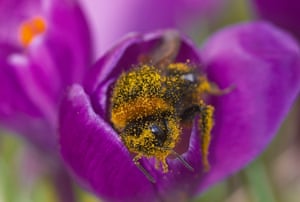https://www.theguardian.com/environment/2017/aug/14/pesticides-could-wipe-out-bumblebee-populations-study-shows
A controversial pesticide can potentially wipe out common bumblebee populations by preventing the formation of new colonies, research has shown.
The neonicotinoid chemical thiamethoxam dramatically reduces egg-laying by queen bumblebees, say scientists.
Predictions based on a mathematical model suggest this could result in the total collapse of local populations of the wild bees.
Lead researcher Professor Nigel Raine, from the University of Guelph in Ontario, Canada, said: “Bumblebee queens that were exposed to the neonicotinoid were 26% less likely to lay eggs to start a colony.
“A reduction this big in the ability of queens to start new colonies significantly increases the chances that wild populations could go extinct.”
In 2013 a two-year temporary ban on the use of neonicotinoids on flowering crops was imposed throughout the European Union due to claims the nicotine-related chemicals can harm pollinators. Currently the ban remains in place while it is under review.
Environmental campaigners want to see a permanent ban extended to all crops, while farmers have warned this could lead to crop losses and a return to older, more harmful pesticides.
One argument against the pro-ban lobby has been that most neonicotinoid research has focused on honeybees and ignored the important contribution to crop pollination made by wild bees, including bumblebees.
The new study exposed bombus terrestris bumblebee queens to thiamethoxam in spring, when the insects emerge from hibernation and prepare to lay their first eggs.
Roughly half of a population of 300 bees were fed syrup laced with the pesticide at levels similar to those found in wild pollen and nectar.
Egg-laying behaviour and death rates were observed for 10 weeks.
The research, published in the journal Nature Ecology & Evolution, showed that queens exposed to the pesticide laid 26% fewer eggs than those that were not exposed.
A mathematical model was then used to predict what such a rate of decline might mean in the real world.
The effect on population dynamics “dramatically increased” the chances of local extinction, the scientists found.
Prof Raine said: “When a queen is going to set up a colony, she will secrete wax and form it into containers for nectar and pollen.
“She will then begin to lay her eggs and sit on them like a bird … these spring queens represent the next generation of bumblebee colonies. This study shows that neonicotinoids could be having a devastating effect on wild bumblebee populations.
“We urgently need to know more about how pesticides could be affecting other species to make informed decisions about the risks associated with using these chemicals.”
Since you’re here …
… we have a small favour to ask. More people are reading the Guardian than ever but advertising revenues across the media are falling fast. And unlike many news organisations, we haven’t put up a paywall – we want to keep our journalism as open as we can. So you can see why we need to ask for your help. The Guardian’s independent, investigative journalism takes a lot of time, money and hard work to produce. But we do it because we believe our perspective matters – because it might well be your perspective, too.
I appreciate there not being a paywall: it is more democratic for the media to be available for all and not a commodity to be purchased by a few. I’m happy to make a contribution so others with less means still have access to information.Thomasine F-R.
If everyone who reads our reporting, who likes it, helps to support it, our future would be much more secure.

沒有留言:
張貼留言